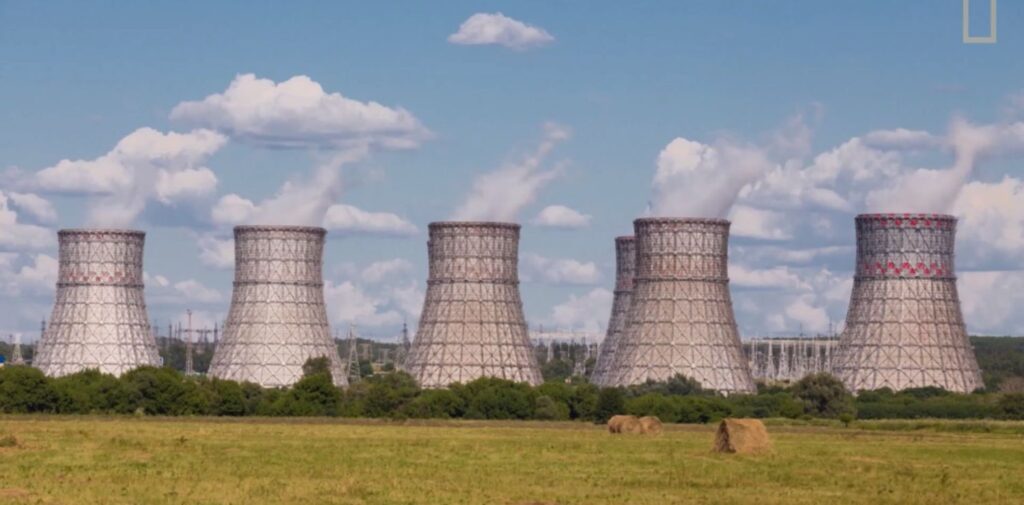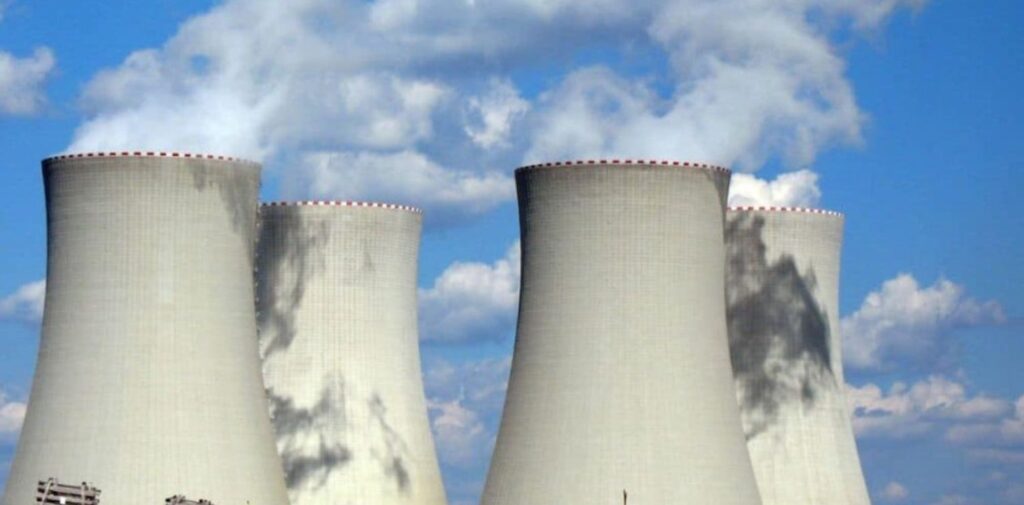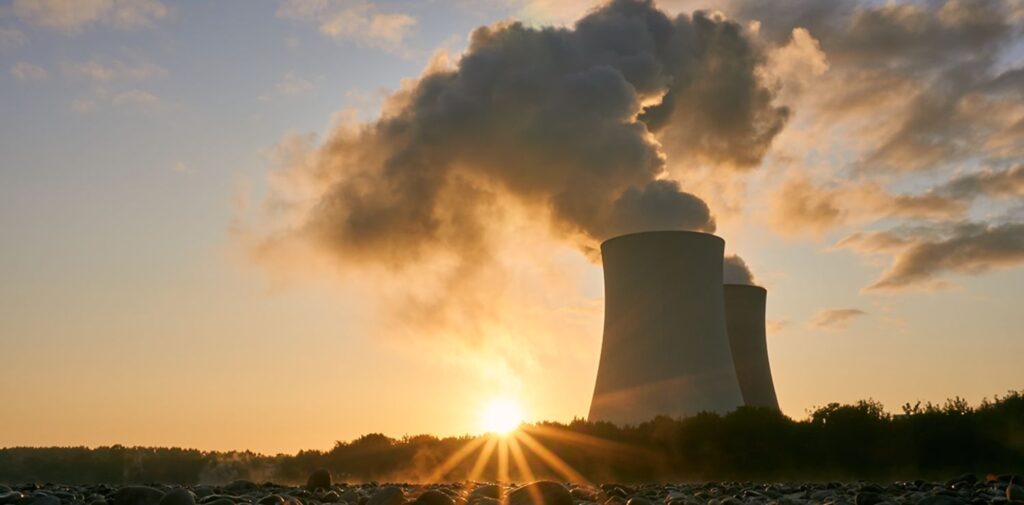Nuclear energy plays an important role in providing electricity in many countries around the world. In India, it is seen as a key part of the future energy mix, helping to meet the growing demand for power. But like every new technology, nuclear energy comes with both opportunities and challenges. Let’s take a look at what nuclear energy is, how India is planning to use it, and what challenges the country faces as it moves forward.
What is Nuclear Energy?
Before we understand the future of nuclear energy in India, it’s important to know what nuclear energy is. Nuclear energy is produced when atoms, the tiny building blocks of matter, are split apart in a process called “fission.” This releases a huge amount of energy in the form of heat, which can then be used to produce electricity.
In a nuclear power plant, this heat is used to turn water into steam, which spins a turbine connected to a generator that produces electricity. Nuclear energy is a clean source of power because it doesn’t create air pollution like burning coal or oil. However, it does have its own set of challenges, especially related to safety and waste disposal.

India’s Growing Need for Energy
India is a country with over 1.4 billion people, and this large population needs a lot of energy. Over the past few decades, India’s economy has been growing fast, and as more industries are built, people are using more electricity in their homes, schools, offices, and factories. To meet this increasing demand, India needs to find new ways to generate power.
Currently, most of India’s electricity comes from coal, which is bad for the environment. The country has also been using renewable sources like solar and wind energy, but these sources are not always reliable because the sun doesn’t always shine, and the wind doesn’t always blow. This is where nuclear energy can help. Nuclear power is reliable and can produce a lot of electricity at once, making it an important part of India’s future energy plans.
India’s Nuclear Energy Plan
India has been using nuclear energy for power since the 1960s. The country has built nuclear power plants in different parts of the country, and over time, it has developed the technology to build its own reactors. India is focusing on expanding its nuclear power capacity as part of its long-term plan to reduce its dependence on coal and other fossil fuels.
In 2010, India announced a plan to increase its nuclear power capacity to 63,000 megawatts (MW) by 2032. Currently, India has about 7,000 MW of nuclear power capacity, but the country is working on building more reactors and plants. This means that in the future, nuclear energy could play a bigger role in meeting India’s energy needs.
India is also making efforts to use nuclear energy for other purposes, such as providing energy for rural areas, improving healthcare with nuclear medicine, and producing hydrogen for clean energy.

The Advantages of Nuclear Energy
Nuclear energy offers several advantages that make it an attractive option for India’s future energy needs.
- Clean and Green Energy: Unlike coal or natural gas, nuclear energy doesn’t create air pollution. It doesn’t release carbon dioxide (CO2) into the atmosphere, which is one of the main causes of global warming. As India works towards reducing its carbon emissions to fight climate change, nuclear energy can help by providing a cleaner source of power.
- Reliable Power Supply: Unlike renewable sources like wind and solar, nuclear power is not dependent on the weather. Nuclear power plants can produce electricity 24/7, making them a reliable source of energy. This is important in a country like India, where power shortages can disrupt daily life.
- Large Energy Production: Nuclear power plants can generate a huge amount of electricity from a small amount of fuel. This makes nuclear energy a very efficient source of power. A single nuclear plant can produce as much electricity as many coal or natural gas plants combined, which helps to meet the growing energy needs of the country.
- Energy Security: India imports a lot of its oil and natural gas, which can be expensive and unreliable. Nuclear energy can help India become more energy-independent by using locally available uranium and other nuclear fuel sources. This increases the country’s energy security, reducing its dependence on foreign sources of energy.
The Challenges of Nuclear Energy
While nuclear energy has many advantages, it also faces some serious challenges. Let’s take a look at some of the key issues.
- Safety Concerns: The biggest concern with nuclear energy is safety. Nuclear accidents, though rare, can have serious consequences. The most famous nuclear accident in history was the 1986 Chernobyl disaster in Ukraine, where a nuclear reactor exploded, causing widespread radiation. Another well-known incident was the 2011 Fukushima disaster in Japan, which occurred after a massive earthquake and tsunami damaged a nuclear power plant. In India, safety is a top priority when building and operating nuclear power plants. The government has strict rules and regulations in place to ensure the safety of workers, nearby communities, and the environment. However, some people are still worried about the risks of nuclear accidents and the impact they could have.
- Nuclear Waste Disposal: Another challenge with nuclear energy is how to deal with nuclear waste. When nuclear fuel is used in reactors, it becomes radioactive and needs to be stored safely for thousands of years. India does not yet have a permanent solution for storing nuclear waste, so it is currently stored at nuclear plants in special containers. Scientists are working on finding safe ways to store and manage nuclear waste, but it remains a concern for the future.
- High Costs: Building nuclear power plants is expensive. The construction of a single nuclear plant can cost billions of dollars, and it takes many years to build. This makes nuclear energy a less affordable option compared to renewable energy sources like solar and wind, which have lower upfront costs. However, once a nuclear plant is built, it can provide cheap and reliable power for many years, making it a worthwhile investment in the long term.
- Public Opposition: In some parts of India, people are opposed to the idea of building new nuclear power plants. This is because of fears about safety and the potential impact on local communities. Protests against nuclear power plants have occurred in places like Koodankulam in Tamil Nadu, where a nuclear plant is being built. The government needs to address these concerns and ensure that the public is well-informed about the safety measures in place.
- The Way Forward: Despite these challenges, nuclear energy remains an important part of India’s energy future. The government is committed to increasing the country’s nuclear power capacity and is taking steps to address the challenges, such as improving safety standards, finding solutions for nuclear waste disposal, and reducing the cost of nuclear energy. India is also working on developing new technologies in the nuclear energy sector. For example, the country is investing in thorium-based nuclear reactors, which are considered safer and more efficient than traditional uranium-based reactors. These reactors could play a big role in the future of nuclear energy in India.

Conclusion
Nuclear energy has a big role to play in India’s future. It offers a reliable, clean, and efficient source of power that can help meet the country’s growing energy needs. However, there are also challenges related to safety, waste disposal, and cost that need to be addressed. With the right investments in technology, safety, and public awareness, nuclear energy can help India become a leader in clean energy and secure a brighter, more sustainable future for its people.




